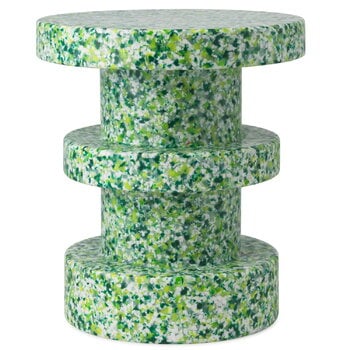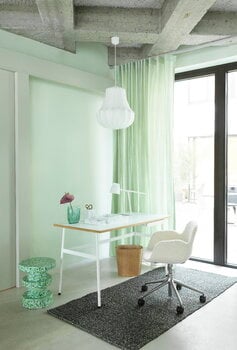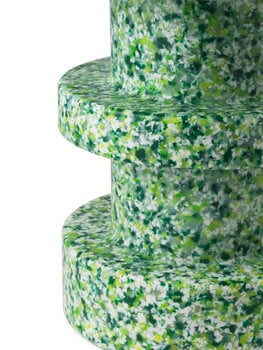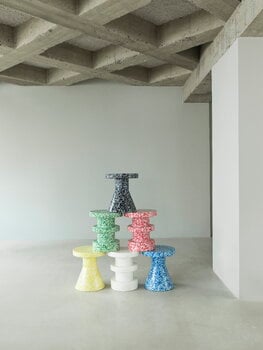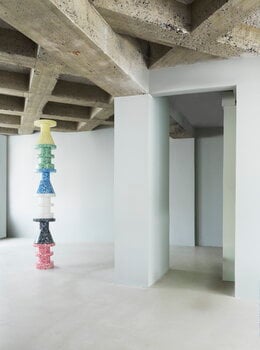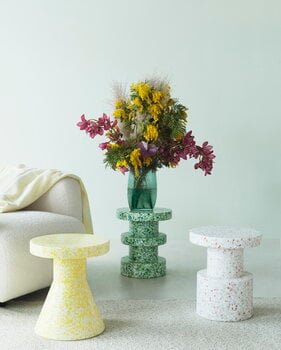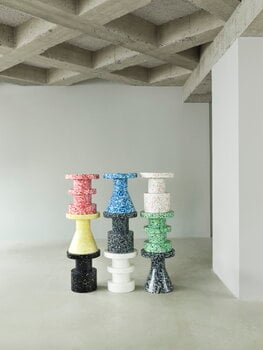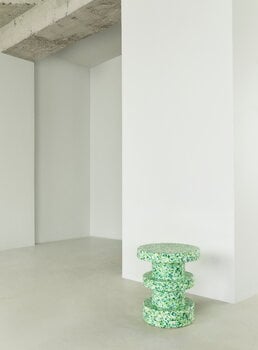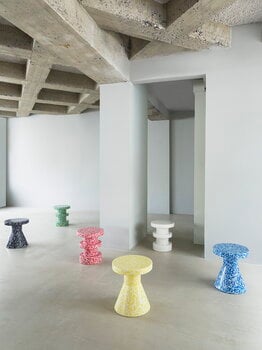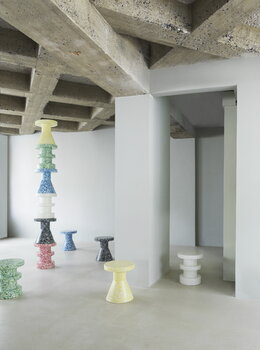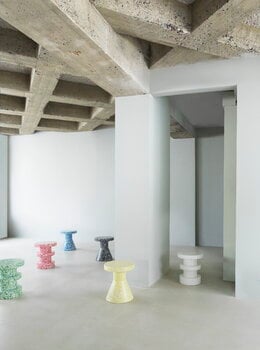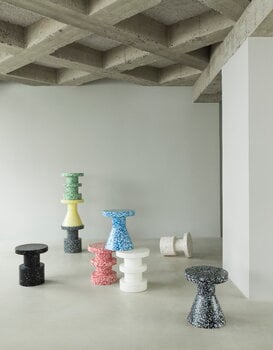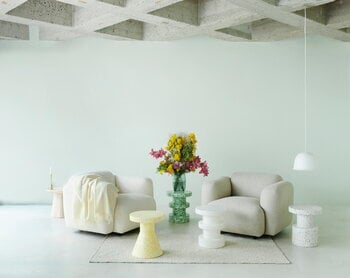Normann Copenhagen's Bit stool is a delightfully distinct multi-purpose piece of furniture that acts as a seat, side table, and stand for flowers and green plants. Designed by Simon Legald, the stool is made of recycled plastic, with its monolithic shape enlivened by a dotted surface that stems from the material: during the stool's production process, molten bits of colourful plastic settle in each stool in a slightly different way. Therefore, each stool is also unique. The Bit stool can be used both indoors and outdoors, as it withstands temperatures from -10°C to +50°C.
Bit stool, stack, green
Normann Copenhagen
Description
Normann Copenhagen's Bit stool is a delightfully distinct multi-purpose piece of furniture that acts as a seat, side table, and stand for flowers and green plants. Designed by Simon Legald, the stool is made of recycled plastic, with its monolithic shape enlivened by a dotted surface that stems from the material: during the stool's production process, molten bits of colourful plastic settle in each stool in a slightly different way. Therefore, each stool is also unique. The Bit stool can be used both indoors and outdoors, as it withstands temperatures from -10°C to +50°C.
Product details (6)
- Colour
- Green
- Height
- 42 cm
- Diameter
- 36 cm
- Material
- LDPE
- Weight
- 4.5 kg
- Care instructions
- Clean with a damp cloth
- Product ID
Designer
Simon Legald (b. 1986) is a Danish designer and Head of Design at Normann Copenhagen. Graduating from the Royal Danish Academy of Fine Arts in 2012, Legald began his long and productive collaboration with Normann Copenhagen shortly after. His designs blend traditional craftsmanship with industrial techniques, focusing on modern simplicity and a precise balance between functionality and visual aesthetics. One of Legald's best-known works is the Form chair collection, which received the iF Design Award in 2016.
View all productsReviews (2)
5
Based on 2 reviews
-
A
Anonymous
Villanueva del Pardillo, Spain
Fantástico, precioso, especial
420 days ago
-
G
Gilberto P
Lisbon, Portugal
292 days ago
Sustainability
The Product Sustainability Framework, our criteria of sustainable design, helps you find the most sustainable products in our selection. Read below which sustainability criteria this product has met.
Working conditions & labour 7/9
-
Equal opportunities for all employees
-
Commitment to UN Global Compact, fair compensation for all employees
-
Corporate responsibility requirements defined and communicated for suppliers
-
Systematic work for improved inclusion and well-being in the workplace
-
Transparent supply chain
-
Suppliers' compliance to a code of conduct ensured
-
Compliance to the UN Guiding Principles on Business and Human Rights ensured in the supply chain
-
Direct suppliers audited and certified
-
Support for community involvement in the supply chain
Eco-friendly production 6/9
-
Fair and resource-wise water-use in production
-
No incineration or landfilling of returned items
-
No use of endangered species as materials
-
No direct environmental emissions or waste (excl. GHGs) from production
-
Material-efficient and ecological packaging
-
No potentially harmful chemicals used in own production
-
The sustainability of direct suppliers' production is addressed and monitored
-
Production and material sourcing that respect biodiversity, animal rights, and natural ecosystems
-
Positive impact on nature’s well-being through operations that regenerate natural ecosystems
Climate impact 5/8
-
Company's direct greenhouse gas emissions identified and commitment to reduction
-
Product's carbon impact identified and commitment to reduction
-
Guidance on energy- and eco-efficient use of the product
-
Contribution to climate initiatives beyond the brand’s direct operations
-
Carbon footprint of the product calculated and goals set to reduce it
-
Low-carbon or compensated transportation
-
100 % renewable energy in own production and operations
-
Carbon neutral or carbon negative product
Sustainable materials 5/6
-
Sustainable and long-lasting material choices
-
No harmful or hazardous substances
-
Responsible raw material sourcing and production
-
Materials suited for circularity: monomaterials, recyclable finishings, renewable or recycled contents etc.
-
Ecological materials: natural, biodegradable, recyclable or recycled contents
-
Outstanding materials in terms of innovativeness, responsibility, sustainability and circularity: local production or sourcing, 100 % recycled content, C2C-certification etc.
Circular design 4/5
-
High aesthetic quality promoting long-term use of the product
-
Design for enduring life-long quality
-
Design and support for product maintenance, repair and upgradability
-
Innovative circular design solutions: circular service system, resale platform, remanufacturing, collection of used products, etc.
-
Technically durable product design and material choices
